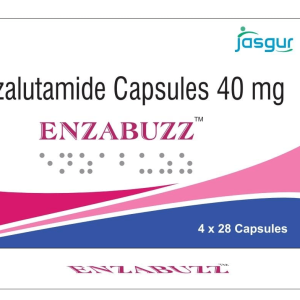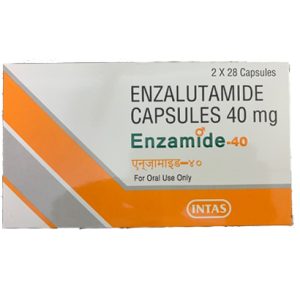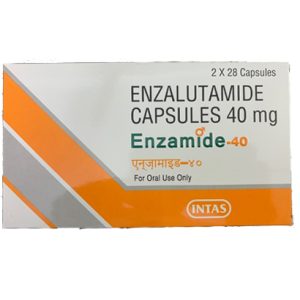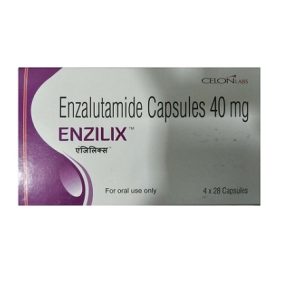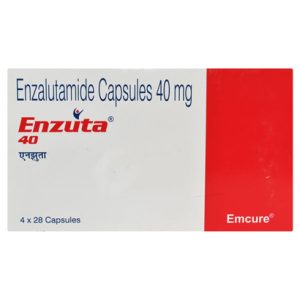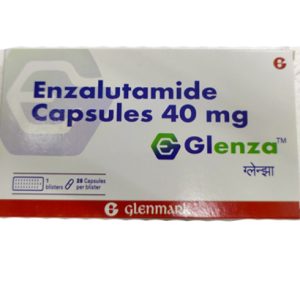-
( reviews)
E7080 Lenvatinib Capsules Brands
Lenvatinib Brand Name :
- Lenvat Lenvatinib 4 mg (Manufactured By : Natco Pharma Ltd)
- Lenvat Lenvatinib 10 mg (Manufactured By : Natco Pharma Ltd)
- Lenvenib Lenvatinib 4 mg (Manufactured By : Sun pharmaceuticals Industries Ltd)
- Lenvenib Lenvatinib 10 mg (Manufactured By : Sun pharmaceuticals Industries Ltd)
- Lenvatol Lenvatinib 4 mg (Manufactured By : Cipla Ltd)
- Lenvatol Lenvatinib 10 mg (Manufactured By : Cipla Ltd)
-
( reviews)
Enasidenib Tablet Brands
Enasidenib
This medication is used to treat a certain type of blood cell cancer (acute myeloid leukemia-AML). Enasidenib works by helping your bone marrow grow normal blood cells so you will need fewer blood transfusions.
What Is Enasidenib and How Does It Work?
Enasidenib is a prescription medication used for the treatment of relapsed/refractory acute myeloid leukemia with an isocitrate dehydrogenase-2 mutation as detected by an FDA-approved test.
How to use Enasidenib 50 Mg Tablet
Read the Medication Guide provided by your pharmacist before you start taking enasidenib and each time you get a refill. If you have any questions, ask your doctor or pharmacist.
Take this medication by mouth with or without food as directed by your doctor, usually once daily. Swallow the tablets whole. Do not crush or split the tablets.
Take this medication with a full glass of water (8 ounces/240 milliliters) unless your doctor directs you otherwise.
The dosage is based on your medical condition and response to treatment.
Enasidenib Tablet side effects
Get emergency medical help if you have signs of an allergic reaction: hives; difficult breathing; swelling of your face, lips, tongue, or throat.
Enasidenib can cause a condition called differentiation syndrome, which affects blood cells and can be fatal if not treated. This condition may occur within 10 days to 5 months after you start taking enasidenib.
- Seek medical help right away if you have symptoms of differentiation syndrome:
- fever, cough, trouble breathing;
- bone pain;
- rapid weight gain; or
- swelling in your arms, legs, underarms, groin, or neck.
Not for Sale Information purpose Only -
( reviews)
Enzabuzz Enzalutamide 40mg Capsules
Brand Name : Enzabuzz
Composition: Enzalutamide
Strength’s Available : Enzalutamide 40 mg / Enzalutamide 80 mg / Enzalutamide 160 mg
Manufactured By: Jasgur Life Science
Form: Capsule
Packing: Pack of 4*28 Capsules
International Name: XtandiGeneric Enzalutamide Brands Name:
- Bdenza 40 mg (By: BDR Pharma)
- Glenza 40 mg (By: Glenmark Pharmaceuticals)
- Enzamide 40 mg (By : Intas)
- Indenza 40 mg (By: Aprazer)
-
( reviews)
Enzalutamide 160mg Capsules Online
Generic Enzalutamide Brands Name:
- Bdenza 40 mg (By: BDR Pharma)
- Glenza 40 mg (By: Glenmark Pharmaceuticals)
- Enzamide 40 mg (By : Intas)
- Indenza 40 mg (By: Aprazer)
-
( reviews)
Enzamide 40 mg Enzalutamide Capsules
Brand Name : Enzamide
Composition: Enzalutamide
Strength’s Available : Enzalutamide 40 mg / Enzalutamide 80 mg / Enzalutamide 160 mg
Manufactured By: Intas Pharmaceuticals
Form: Capsule
Packing: Pack of 4*28 Capsules
International Name: XtandiGeneric Enzalutamide Brands Name:
- Bdenza 40 mg (By: BDR Pharma)
- Glenza 40 mg (By: Glenmark Pharmaceuticals)
- Enzamide 40 mg (By : Intas)
- Indenza 40 mg (By: Aprazer)
-
( reviews)
Enzamide 40mg Capsules, Enzalutamide
Brand Name : Enzamide
Composition: Enzalutamide
Strength’s Available : Enzalutamide 40 mg / Enzalutamide 80 mg / Enzalutamide 160 mg
Manufactured By: Intas Pharmaceuticals
Form: Capsule
Packing: Pack of 4*28 Capsules
International Name: XtandiGeneric Enzalutamide Brands Name:
- Bdenza 40 mg (By: BDR Pharma)
- Glenza 40 mg (By: Glenmark Pharmaceuticals)
- Enzamide 40 mg (By : Intas)
- Indenza 40 mg (By: Aprazer)
-
( reviews)
Enzilix Enzalutamide 40mg Capsules
Brand Name : Enzilix
Composition: Enzalutamide
Strength’s Available : Enzalutamide 40 mg / Enzalutamide 80 mg / Enzalutamide 160 mg
Manufactured By: Celon Labs
Form: Capsule
Packing: Pack of 4*28 Capsules
International Name: XtandiGeneric Enzalutamide Brands Name:
- Bdenza 40 mg (By: BDR Pharma)
- Glenza 40 mg (By: Glenmark Pharmaceuticals)
- Enzamide 40 mg (By : Intas)
- Indenza 40 mg (By: Aprazer)
-
(1)
Enzuta 40mg Enzalutamide Capsule
Brand Name : Enzuta
Composition: Enzalutamide
Strength’s Available : Enzalutamide 40 mg / Enzalutamide 80 mg / Enzalutamide 160 mg
Manufactured By: Emcure
Form: Capsule
Packing: Pack of 4*28 Capsules
International Name: XtandiGeneric Enzalutamide Brands Name:
- Bdenza 40 mg (By: BDR Pharma)
- Glenza 40 mg (By: Glenmark Pharmaceuticals)
- Enzamide 40 mg (By : Intas)
- Indenza 40 mg (By: Aprazer)
-
( reviews)
Enzuta Enzalutamide 40mg Capsules
Brand Name : Enzuta
Composition: Enzalutamide
Strength’s Available : Enzalutamide 40 mg / Enzalutamide 80 mg / Enzalutamide 160 mg
Manufactured By: Emcure
Form: Capsule
Packing: Pack of 4*28 Capsules
International Name: XtandiGeneric Enzalutamide Brands Name:
- Bdenza 40 mg (By: BDR Pharma)
- Glenza 40 mg (By: Glenmark Pharmaceuticals)
- Enzamide 40 mg (By : Intas)
- Indenza 40 mg (By: Aprazer)
-
( reviews)
Gilteritinib 40mg Tablet Brands
What is Gilteritinib Tablet?
Gilteritinib 40mg Tablets is a prescription medication used to treat adults with relapsed or refractory acute myeloid leukemia (AML) with a specific genetic mutation called FLT3.
Gilteritinib is an AXL receptor tyrosine kinase inhibitor used to treat relapsed or refractory acute myeloid leukemia.
Indications of Indian Gilteritinib Tablet:
Treatment of relapsed or refractory acute myeloid leukemia (AML) with a FMS-like tyrosine kinase 3 (FLT3) mutation.
Mechanism of action of Generic Gilteritinib Brands:
Gilteritinib is a kinase inhibitor, which means it works by blocking certain enzymes (kinases) that are involved in the growth and survival of cancer cells.
Relevant Queries Leading To This Page
Gilteritinib Tablet side effects, Gilteritinib Tablet price, Gilteritinib Tablet uses, Gilteritinib Tablet dosage, side effects of Gilteritinib Tablet, benefits of Gilteritinib TabletDosage and administration of Gilteritinib Tablet Thailand:
The recommended starting dose is 120 mg taken orally once daily.
The dose may be increased or decreased based on the patient’s individual response and tolerability.
Gilteritinib tablets should be taken with food.
What are the Side effects of Gilteritinib Tablet Online?
Some of the most common side effects of Gilteritinib include:
- Fatigue
- Anemia
- Diarrhea
- Nausea
- Vomiting
- Decreased appetite
- Headache
- Musculoskeletal pain
- Peripheral edema
- Bruising
- Increased risk of infections
Disclaimer
The information and contents of this website are for informational purposes only. They are not intended to be a substitute for professional medical advice, diagnosis, or treatment. Please seek the advice of your doctor and discuss all your queries related to any disease or medicine. Do not disregard professional medical advice or delay in seeking it because of something you have read on LetsMeds. Our mission is to support, not replace, the doctor-patient relationship.
NOT FOR SALE : INFORMATION PURPOSE ONLY -
( reviews)
Gilteritinib 40mg Tablets
What is Gilteritinib 40mg Tablets?
Gilteritinib 40mg Tablets is a prescription medicine used to treat adults with acute myeloid leukemia (AML) with an FMS-like tyrosine kinase 3 (FLT3) mutation when the disease has come back or has not improved after previous treatment(s). Your healthcare provider will perform a test to make sure Gilteritinib 40mg Tablets are right for you. It is not known if Gilteritinib 40mg Tablets is safe and effective in children.
What is the most important information I should know about Gilteritinib 40mg Tablets?
Differentiation Syndrome is one of the major negative effects that Gilteritinib 40mg Tablets may cause. Blood cell disorders such as Differentiation Syndrome can be fatal or life-threatening if left untreated. During the first three months of treatment, and even as soon as one day after commencing Gilteritinib 40mg Tablets, Differentiation Syndrome can occur. If you experience any of the following differentiation syndrome symptoms while taking Gilteritinib 40mg Tablets: fever, cough, dizziness or lightheadedness, rapid weight gain, difficulty breathing, swelling of your arms or legs, rash, decreased urination, call your healthcare provider or head straight to the nearest hospital emergency room. If you experience any of these differentiation syndrome symptoms, your doctor may prescribe a corticosteroid medication as well as monitor you in the hospital.
Who should not take Gilteritinib 40mg Tablets?
Do not take Gilteritinib 40mg Tablets if you are allergic to Gilteritinib or any of the ingredients in Gilteritinib 40mg Tablets.
What are the possible side effects of Gilteritinib 40mg Tablets?
Gilteritinib 40mg Tablets may cause serious side effects including:
See “What is the most important information I should know about Gilteritinib 40mg Tablets?” above.
Syndrome of Posterior Reversible Encephalopathy (PRES). If you use Gilteritinib 40mg Tablets, you can run the risk of getting PRES, a brain disorder. If you experience a seizure or rapidly worsening symptoms like headache, decreased alertness, disorientation, diminished vision, blurred vision, or other visual issues, notify your healthcare professional straight away. To screen for PRES, your healthcare professional will do a test. If you get PRES, your doctor will discontinue giving you Gilteritinib 40mg Tablets.
QTc prolongation is the term for alterations in your heart’s electrical activity. Life-threatening irregular heartbeats can result from QTc prolongation. Both before and throughout your Gilteritinib 40mg Tablet treatment, your healthcare practitioner will perform an electrocardiogram (ECG) to measure the electrical activity of your heart. If you experience fainting, dizziness, or lightheadedness, notify your healthcare professional right away. Low levels of potassium or magnesium in the blood increase the risk of QT prolongation. Blood tests will be performed by your healthcare practitioner to measure your magnesium and potassium levels both before and throughout Gilteritinib 40mg Tablet treatment.
pancreatitis, or inflammation of the pancreas. If you experience severe stomach pain that does not go away, you should notify your healthcare professional straight away. This pain may occur in the presence or absence of nausea and vomiting.
The most common side effects of Gilteritinib 40mg Tablets include:
Changes in liver function tests
Joint or muscle pain
Tiredness
Fever
Pain or sores in mouth or throat
Swelling of arms or legs
Rash
Diarrhea
Shortness of breath
Nausea
Cough
Constipation
Eye problems
Headache
Dizziness
Low blood pressure
Vomiting
Decreased urination
Your healthcare provider may tell you to decrease your dose, temporarily stop, or completely stop taking Gilteritinib 40mg Tablets if you develop certain side effects during treatment with Gilteritinib 40mg Tablets.
These are not all of the possible side effects of Gilteritinib 40mg Tablets. Call your doctor for medical advice about side effects.
What should I tell my doctor before taking Gilteritinib 40mg Tablets?
Tell your doctor:
About all of your medical conditions.
If you suffer from cardiac issues, such as long QT syndrome.
If you experience issues with abnormal levels of sodium, potassium, or magnesium in your body.
If you are or intend to get pregnant. Gilteritinib 40mg Tablets may be harmful to the developing fetus. If you become pregnant while taking Gilteritinib 40mg Tablets or suspect you might be pregnant, notify your doctor at away.
If you can become pregnant, your healthcare provider may perform a pregnancy test 7 days before you start treatment with Gilteritinib 40mg Tablets.
Females who can become pregnant should use effective birth control (contraception) during treatment with Gilteritinib 40mg Tablets and for 6 months after the last dose of Gilteritinib 40mg Tablets.
Males who have female partners who can become pregnant should use effective birth control (contraception) during treatment with Gilteritinib 40mg Tablets and for 4 months after the last dose of Gilteritinib 40mg Tablets.
If you are breastfeeding or plan to breastfeed. It is not known if Gilteritinib 40mg Tablets pass into your breast milk. Do not breastfeed during treatment with Gilteritinib 40mg Tablets and for 2 months after the last dose of Gilteritinib 40mg Tablets.
nearly every medication you take, including vitamins, herbal supplements, and both prescription and over-the-counter medications. The effects of other medications on Gilteritinib 40mg Tablets and the effects of other medications on Gilteritinib 40mg Tablets may coexist.
How should I take Gilteritinib 40mg Tablets?
Take Gilteritinib 40mg Tablets exactly as your healthcare provider tells you.
Do not change your dose or stop taking Gilteritinib 40mg Tablets unless your healthcare provider tells you to.
Take Gilteritinib 40mg Tablets 1 time a day at about the same time each day.
Swallow Gilteritinib 40mg Tablets tablets whole.
Gilteritinib 40mg Tablets can be taken with or without food.
Do not break, crush, or chew Gilteritinib 40mg Tablets tablets.
If you miss a dose of Gilteritinib 40mg Tablets, take your dose as soon as possible on the same day at least 12 hours before your next scheduled dose. Start your routine again the next day. Never take two doses in 12 hours.
-
( reviews)
Glenza Enzalutamide 40mg Capsule
Brand Name : Glenza
Composition: Enzalutamide
Strength’s Available : Enzalutamide 40 mg / Enzalutamide 80 mg / Enzalutamide 160 mg
Manufactured By: Glenmark Pharmaceuticals
Form: Capsule
Packing: Pack of 4*28 Capsules
International Name: XtandiGeneric Enzalutamide Brands Name:
- Bdenza 40 mg (By: BDR Pharma)
- Glenza 40 mg (By: Glenmark Pharmaceuticals)
- Enzamide 40 mg (By : Intas)
- Indenza 40 mg (By: Aprazer)
WhatsApp / Viber
Available On All Major Platform
+91 7428091874
Express Worldwide Shipping
Order Above $99



